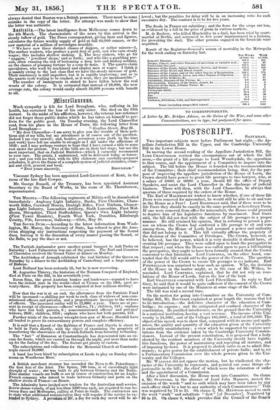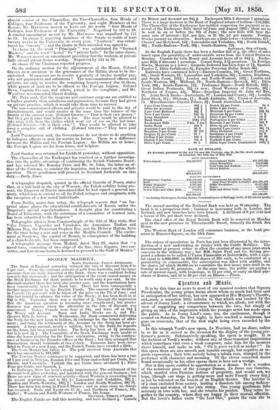POSTSCRIPT.
SATTIRDAY.
Two important subjects were before Parliament last night,—the Ap- pellate Jurisdiction Bill in the Upper, and the Cambridge University Bill in the Lower House.
In moving the second reading of the Appellate Jurisdiction Bill, the LORD CHANCELLOR revived the circumstances out of which the bill arose,—the grant of a life peerage to Lord Wensleydale, the opposition to that course, and the appointment of a Committee to inquire into the subject. The bill before the House is founded on the recommendations of the Committee ; their chief recommendation being, that, for the pur- pose of improving the appellate jurisdiction of the House of Lords, the Crown should have power to grant life peerages to two lawyers, who, at a salary of 6000/. or 6000/. a year, should fill the office of Deputy Speakers, and assist the Lord Chancellor in the discharge of judicial business. There will then, with the Lord Chancellor, be always that quorum of three required by the orders of the House. The Earl of MaLmirsannit wished to know whether, if one of these life Peers were removed for misconduct, he would still be able to sit and vote in the House as a Peer? Lord REDESDALE said, that if there were to be life Peers they should be exactly in the same position as hereditary Peers. If one were removed from office for misconduct, the House could proceed to deprive him of his legislative functions by enactment. Earl GREY said, the bill did not deal with the subject of life peerages in a proper manner. He still retained his opinion, that in refusing to permit a per- son on whom the Crown had conferred a life peerage to sit and vote among them, the House of Lords had assumed a power and authority that did not belong to it. This bill virtually affirms the propriety of the decision of the Committee of Privileges. The Crown, however, as he believed, has the power, which it is very desirable it should have, of creating life peerages. They were called upon to limit the prerogative in that respect ; and when the House was called upon to pass a bill limiting the prerogative, they ought to have been formally assured that the Crown consented to that limitation. Lord CAMPBELL, on the other hand, con- tended that the bill would add to the power of the Crown. The question of the power of the Crown to create life peerages is res judicata. Earl Frrzwiraram was surprised to hear such an opinion. Why, the decision of the House in the matter might, as in the case of Mr. Wilkes, be rescinded. Lord CAMYBELL explained, that he did not rely on reso- lutions of the House of Lords, but on the law of the land. Earl GRANVILLE concurred with Lord Fitz william. In reply to Earl Grey, he said that it would be quite sufficient if the consent of the Crown were intimated by one of the Ministers at some stage of the bill.
The bill was read a second time.
On the motion for going into Committee on the University of Cam- bridge Bill, Mr. Bouvrara explained at great length the reasons that led to its introduction,—the defective character of the education at Cam- bridge ; its expense ; and the antiquated and confined character of the constitution. Ile justified interference, on the ground that the University is a national institution, having a vast revenue. The income of the Um- versity is 24,5001., and of the Colleges 185,0001., a total of 209,5001. The object of his speech was to show that, compared with its means and appli- ances, the quality and quantity of the education given at the University is eminently unsatisfactory ; a view which he supported by copious quo- tations front the evidence taken by the Cambridge University Commis- sioners. Instead of the present constitution, it is proposed that a body elected by the resident members of the University should have legisla- tive functions, the power of maintaining and repealing all statutes, and of imposing by-laws. It is proposed to abolish oaths so as to admit Dis- senters; to give power for the establishment of private halls ; and to set a Parliamentary Commission over the whole powers given to the Uni- versity and the Colleges. Mr. War.rora did not oppose the motion, but he vindicated the cha- racter of the University he represents, and pointed out some things ob- jectionable in the bill ; the chief of which were the relaxation of oaths
and the appointment of a Commission.
After a brief discussion, the House went into Committee. On clause 4, Mr. STAFFORD, in the absence of Lord John Manners, moved the omission of the words "and no oath which may have been taken by any such officer shall be a bar to any authority of such Commissioners." This was negatived by 76 to 31. On clause 5, Mr. HEYWOOD moved to omit the word "sixth" and substitute "first" [of December. Negatived by 56 to 19, On clause 6, which provides that the Council Of Ao 8etlAt9
should consist of the Chancellor, the Vice-Chancellor, four Heads of Colleges, four Professors of the University, and eight Members of the
Senate, Mr. HEYWOOD moved to leave out the words "four Heads of Colleges, four Professors of the University." Negatived by 102 to 38. A similar amendment moved by Mr. HEYWOOD was negatived by 111 to 63. In clause 7, requiring members of the Senate to reside at least twenty weeks in the University in every year, "fourteen" was substi- tuted for " twenty." ; and the clause as thus amended was agreed to. In clause 24, the word " Principals " was substituted for "licensed Masters," and the word "hostel" for "private halls." In the same clause, Mr. WIORAM moved an amendment providing that the students at private halls should attend divine worship. Negatived by 121 to 79.
At clause 27 the Chairman reported progress.
On the ordinary motion for the adjournment of the House, Colonel GILPIN drew attention to the grievances of the Militia about to be dis-
embodied. If surgeons are to receive a gratuity of twelve months' pay, why not paymasters and subalterns? The noncommissioned officers and privates are only to receive the remaining bounty-money due to them,
While grants of land are to be offered to the Foreign Legion. Colonel Hoes, Captain STUART, and others joined in the complaint ; and Mr. WALPOLE recommended liberal dealing. Mr. PEEL said, that the surgeons and assistant-surgeons are entitled to a higher gratuity than subalterns and paymasters, because they had given up private practice, which it would take them time to recover. The non-commissioned officers and privates would be paid to the day of disembodiment, and would receive at the same time the balance of the
bounty of the current year. [Colonel Gusow—" That is their own money." But they get it some time before it is due. The men would be allowed to take away with them the clothes which went out of use on the last issue. [Colonel Gir.res—"It is their own."] They would be allowed to take away a complete suit of clothing [Colonel. Gimrns—" They have paid for it."]
Lord PALMERSTON said, the Government do not desire to do anything to indispose officers or men for service in future. There is a difference between the Militia and the Foreign Legion : the Militia are at home ; the Foreign Legion are far from home, and helpless.



























 Previous page
Previous page